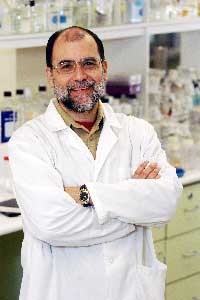 |
| Dr. Rafael Garduno |
The lack of clean drinking water and safe food supplies is a major threat to human health throughout the world. That's why Dr. Rafael Garduno, Canada Research Chair in Food and Waterborne Bacterial Pathogens, is gathering new knowledge about the development and transmission of pathogenic microbes, as well as their interaction with host cells. With this knowledge comes new and better methods of water treatment and food processing, which in turn leads to better health and fewer outbreaks of infectious illnesses.
"We want to know why bacteria that are happily living in water inside amoebas suddenly start affecting humans. What are the molecular mechanisms that allow the bacteria to make this leap?", Dr. Garduno asks. Similarly, why do certain bacteria, normally resident in the human digestive system and the soil where food is grown, sometimes cause uncontrollable outbreaks of illness when present in food?
To answer these questions, Dr. Garduno works with his favourite microscopic "pets" in the lab, Legionella pneumophila and Listeria monocytogenes. Legionella is the waterborne bacterium that causes Legionnaire's disease, an unusual form of pneumonia, while Listeria is a foodborne bacterium known to cause gastrointestinal illness through consumption of contaminated processed foods like smoked salmon, hot dogs and deli meats. These bacteria, although pathogenic in humans, aren't too risky to use in the lab, and are useful models for more dangerous microbes like foodborne Salmonella, or bioterrorism agents that spread through water and aerosols.
His lab is the only one in Canada conducting basic research with Legionella, although Dr. Garduno has research collaborators at several U.S. universities. This research area looks at Legionella's response to water. Specifically, Dr. Garduno is uncovering Legionella's development inside ciliates (tiny single-celled organisms commonly present in all water) where Legionella becomes more virulent, before moving on to infect human cells.
Aside from leading to the control of Legionnaire's disease outbreaks, this research is helping to increase understanding about the mechanisms behind outbreaks of other dangerous bacteria like pathogenic E. coli. "This will give us a model to test new water treatments to kill dangerous pathogens," says Dr. Garduno. He has already identified a genetic marker that could warn us about the presence of the most virulent forms of Legionella, and point at water supplies in need of disinfection.
Dr. Garduno also works closely with researchers in Dalhousie's Department of Food Science and Technology, part of the Faculty of Engineering. "We're joining forces to look at similar problems from different points of view, to reduce the presence of organisms like Listeria in food products," he says. "I can supply knowledge about the bacteria, so they can develop better measures for safe food processing."
Dr. Garduno joined the Departments of Microbiology and Immunology and Medicine in 1997. His other research interests include a collaborative effort with the Institute of Marine Biosciences in Halifax to study aquatic bacteria affecting fish stocks.
